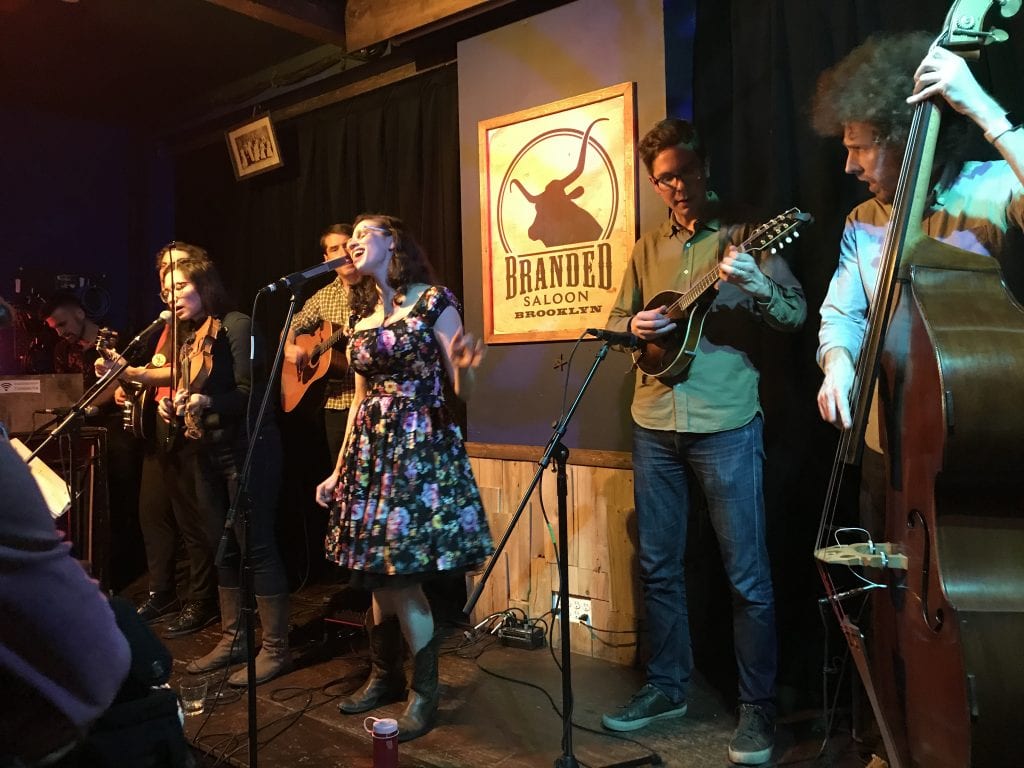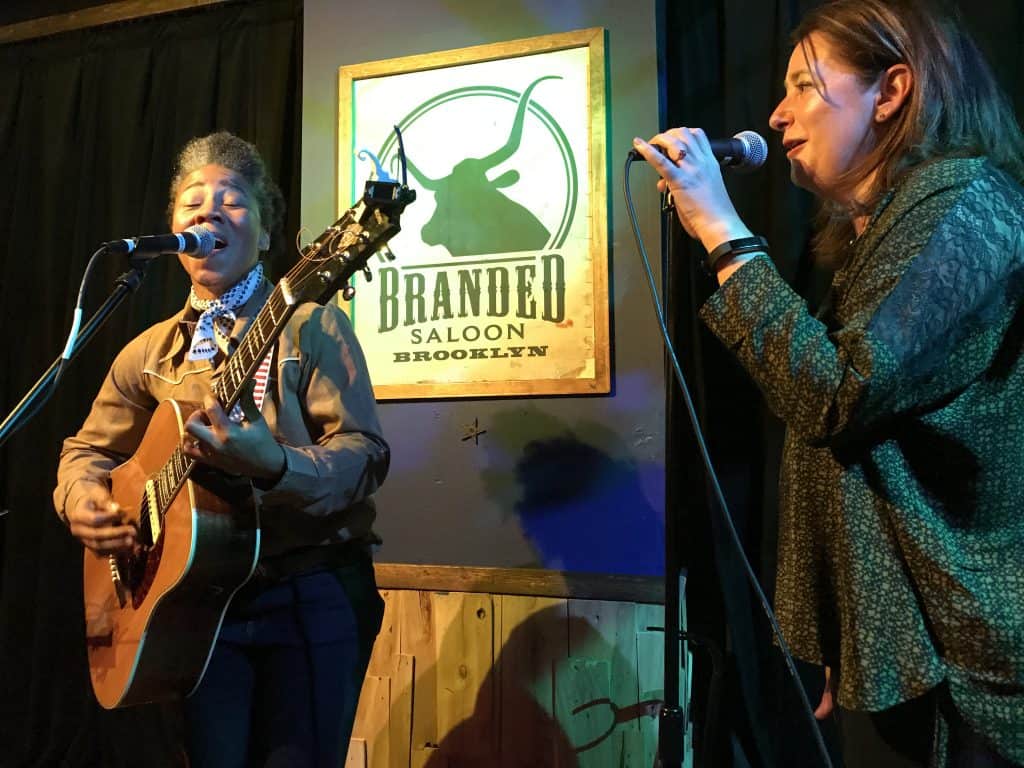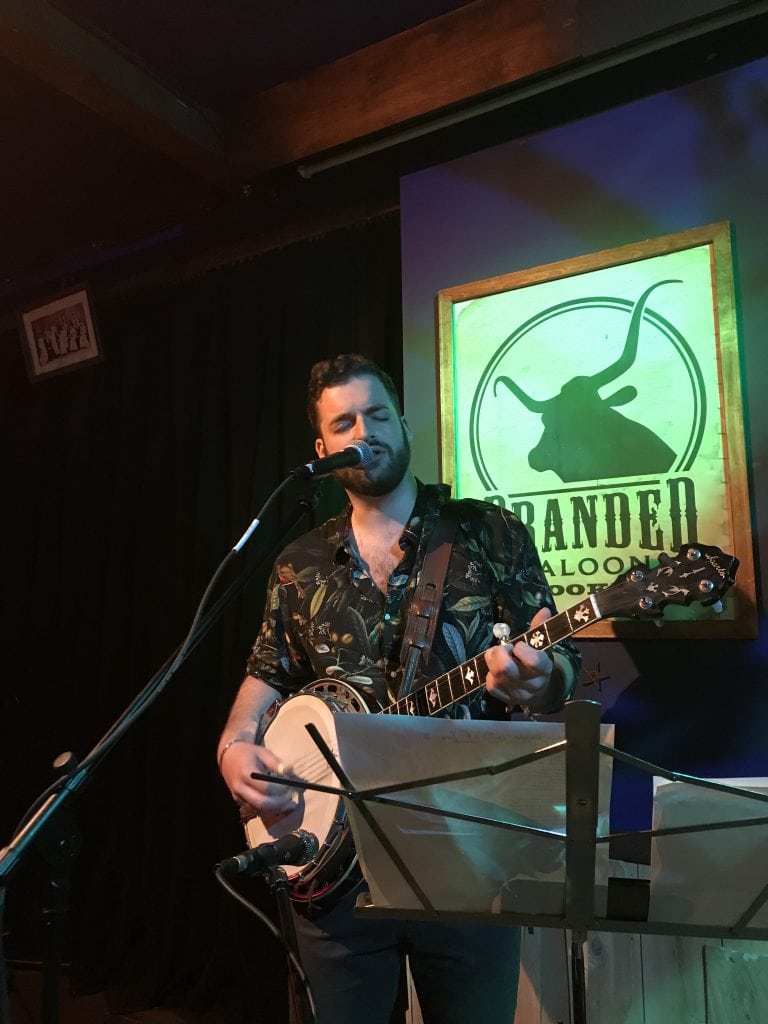Brooklyn’s Legendary Queer Cowfolx
by Rachel Cholst

Last Saturday night was a homecoming of sorts; another in what’s become a decade-long tradition of queer country shows organized by Karen Pittelman (of Karen & the Sorrows), returned to Branded Saloon after a long absence.
My first queer country show was years ago. I’m not even sure how I found out about it; maybe through one of my grad school classmates, who knew about Karen Pittelman through her organizing work. That loose network is the key to Karen’s Queer Country Quarterly series (formerly the Gay Ole Opry.) (For more on the series’ history and impact, see this article on Wide Open Country.)
While Karen is by no means the first queer country artist (the first one we know of is Lavender Country), nor the only queer country artist pounding the floorboards today, it’s safe to say this website would not be around if Karen hadn’t spent the last ten years or so seeking out queer roots artists, inviting them out to New York, getting people in the same room, and putting them in touch with each other to put tours together.
The series has run in monthly and quarterly iterations for the past ten years or so and has seen some truly incredible artists cross the stage — Amythyst Kiah, now up for a Grammy, played her first NYC show at one of Karen’s events held at Branded Saloon. On Wednesday she opened for Yola at a sold-out crowd at Music Hall of Williamsburg.
After a few years at other venues, last night the show returned to Branded, a little bar in the Prospect Heights neighborhood of Brooklyn owned by a queer couple. Branded is a cozy spot with longhorn steer handles on the heavy wooden front doors, a wagon wheel planted out front, with a rainbow flag flying proudly above it. Thanks to the soaring prices of New York real estate, Branded does not label itself as a gay bar — most newer queer places in Brooklyn don’t — but “queer friendly” to ensure that all kinds of cowpokes mosey through the doors and keep the lights in the antler chandeliers on.
As such, this show felt like a homecoming. I saw familiar faces who hadn’t made it out to the shows in other neighborhoods. (It is very Brooklyn to not go to an event if it is more than a mile away.) Me, I spent my twenties trekking from uptown Manhattan (11 miles!), by myself, with friends, occasionally a date, wondering if I’d ever get to a point where I’d be as happy as the 30-something couples at the show. Taking advantage of the hour-long ride home, I’d write my own country songs and daydream about performing on stage with Karen. This time around, I got to slow dance with my girlfriend of 2.5 years the same day we put in an application to lease our first apartment together.
But even if you’re not me, the show was pretty special.

First up to the mic was Luisa Lopez, a Nashville singer-songwriter who, it’s been said, will steal your heart and your woman. Lopez’s voice is rich and mellow, the honey in the medicine of her sharp songwriting. Her most recent album, 45, is a response to the current regime.
Lopez’s lyrics are earnest and straightforward — not much flowery imagery here. There’s too much at stake: Lopez’s songs are a call to conscience — all while reminding us of the sweetness of life through the obvious pleasure she takes in performing. We need both of those things, she seems to say, to live with dignity.
Justin Hiltner‘s set was electric — and I don’t mean his instrument. The Nashville-based banjo player uses his platform admirably. Justin is an editor at The Bluegrass Situation and was just elected to the board of Bluegrass Pride. He’s a tireless ally for all marginalized people in the roots music world. This set mostly consisted of new songs from his forthcoming solo debut. Reader, it is FIRE.

Hiltner brought the house down with his holler-style song “Oligarchs, Nationalists, and Capitalists.” If you doubted the deep radical tradition in Appalachia, that song will fix your notion.
On “1992,” by contrast, Hiltner juxtaposes imagery of someone who died of AIDS in the same hospital within moments of his own birth. It’s Hiltner’s attempt to connect with a generation forever out of reach of us millennial queers, and it hit the whole room hard. If Hiltner releases the album this year, it’s going to be on my top 10 list.
Rounding out the night was Pittelman herself. Instead of the usual Sorrows, Karen brought on the string band she used to record several of the songs from Guaranteed Broken Heart.
This was the cherry on top for the evening — on the one hand, it was a reminder of the powerful intimacy that has drawn me to all corners of Brooklyn for nine years. It was also an intriguing new path for Pittelman’s work: she arranged a few of her older songs, distinctive for their pedal steel parts, into delicate configurations of mandolin, banjo, standup bass, and parlor guitar.
Pittelman announced that the concert will revert to a monthly series for a little bit, and not a moment too soon. Given the events of the last week, we need as many tangible reminders of intimacy, solidarity, and survival as we can get.